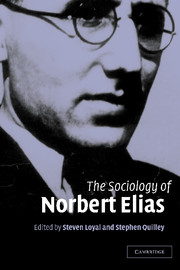Book contents
- Frontmatter
- Contents
- List of contributors
- Acknowledgements
- 1 Towards a ‘central theory’: the scope and relevance of the sociology of Norbert Elias
- Part I Sociology as a human science: Norbert Elias and the sociology of knowledge
- Part II Processes of stratification: figurations of race, class and gender
- Part III The formation of individuals and states
- Part IV Religion and civilizing processes: Weber and Elias compared
- 14 Weber and Elias on religion and violence: warrior charisma and the civilizing process
- 15 Christian religion and the European civilizing process: the views of Norbert Elias and Max Weber compared in the context of the Augustinian and Lucretian traditions
- Index
- References
15 - Christian religion and the European civilizing process: the views of Norbert Elias and Max Weber compared in the context of the Augustinian and Lucretian traditions
Published online by Cambridge University Press: 22 September 2009
- Frontmatter
- Contents
- List of contributors
- Acknowledgements
- 1 Towards a ‘central theory’: the scope and relevance of the sociology of Norbert Elias
- Part I Sociology as a human science: Norbert Elias and the sociology of knowledge
- Part II Processes of stratification: figurations of race, class and gender
- Part III The formation of individuals and states
- Part IV Religion and civilizing processes: Weber and Elias compared
- 14 Weber and Elias on religion and violence: warrior charisma and the civilizing process
- 15 Christian religion and the European civilizing process: the views of Norbert Elias and Max Weber compared in the context of the Augustinian and Lucretian traditions
- Index
- References
Summary
Introduction
Religion does not play a prominent role in Norbert Elias's by now classical study The Civilizing Process. This raises a question. Did Elias, as a critic once asserted, ‘overlook religion’? Or, more precisely, did he underestimate the influence of Christianity in the civilizing process in Western Europe?
Undoubtedly the absence of a systematic discussion of the role of religion in The Civilizing Process reflects a deliberate decision. One likely reason for this decision was Elias's relation to the work of Max Weber. It has been said that underlying a great deal of Max Weber's work is a running discussion with ‘the ghost of Karl Marx’. A similar observation can be made about Elias; many of his writings can be read as a continuing discussion with Max Weber, sometimes explicit, more often tacit, even when Weber is not mentioned by name. Thus Elias took issue with Weber's conception of sociology as starting from ‘subjective action’; with his treatment of the notion of charisma; and with his emphasis on capitalism, Protestantism and (by implication) the bourgeois and the ecclesiastical lines in the European civilizing process.
In this chapter I shall focus on the latter issue, and I shall extend the argument beyond Weber.
- Type
- Chapter
- Information
- The Sociology of Norbert Elias , pp. 265 - 280Publisher: Cambridge University PressPrint publication year: 2004
References
- 8
- Cited by



